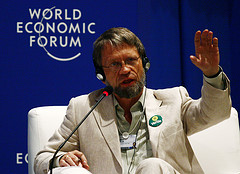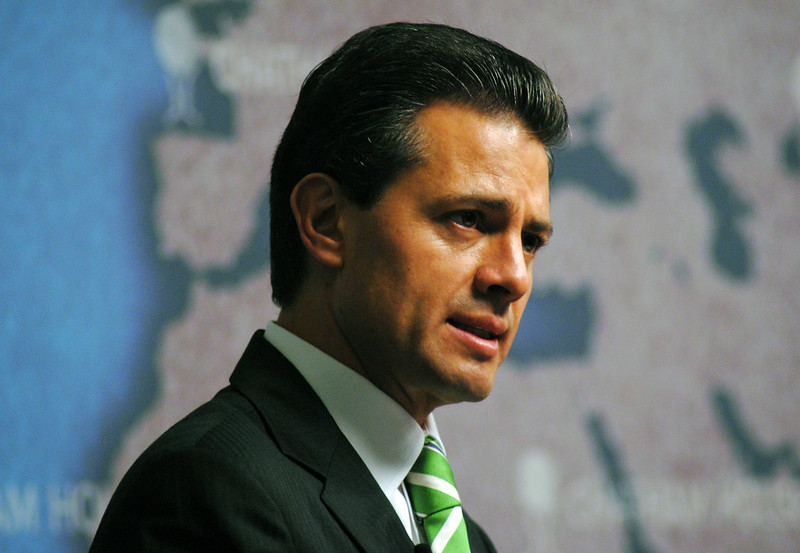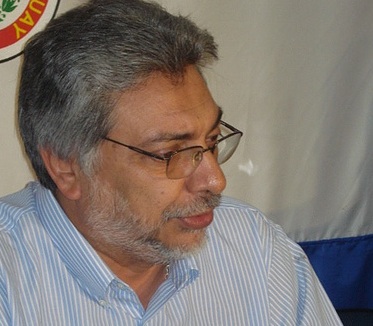
Colombia, Latin America: Week in Review
Colombian Presidential Candidate Antanas Mockus Pulling Ahead, Poll Indicates
April 26, 2010 By Staff

Colombian presidential candidate Antanas Mockus.
Today in Latin America
Top Story — A recently released Colombian poll predicts that Green Party candidate Antanas Mockus would beat Juan Manuel Santos in a second round vote in the country’s next presidential election.
The poll, conducted by the Centro Nacional de Consultoría, had Santos winning the first round by a one percent margin, but losing in the run-off election with 44 percent versus 50 percent for Mockus.
The poll indicated that Colombia’s electorate may be shifting as the May 20 presidential elections approach.
Current President Álvaro Uribe, a conservative, has won great popularity for his hardline approach toward leftist guerrillas and his emphasis on security. First elected in 2002, he was re-elected in 2006 after the country’s Constitution was revised by referendum to allow one consecutive re-election.
Just a year ago, observers expected Uribe to win a second re-election handily if he succeeded in passing a constitutional reform allowing him to run for a third term. When the measure was rejected by Colombia’s Constitutional Court, most thought Santos, Uribe’s former defense minister, would win the upcoming presidential elections, though by a narrower margin.
Antanas Mockus, former mayor of Bogotá running as an independent, has seen his popularity explode after his small Green Party performed well in congressional elections last month.
Analysts credit Mockus’ success in part to his emphasis on civic virtue and tough stance on corruption. Mockus is supported by the business community.
Both candidates are expected to continue Uribe’s security policies, according to Reuters.
Other Top News: Paraguayan lawmakers gave President Fernando Lugo and the army emergency powers Saturday, allowing them to pursue a guerrilla group known as the Paraguayan People’s Army (EPP, in Spanish) that has committed two major kidnappings in the country’s northern territory. The guerrillas allegedly kidnap for ransom, citing a need for change to help the rural poor.
Just Published at the Latin America News Dispatch
- Arizona’s governor Jan Brewer signed a strict new immigration law on Friday.
- With the conference under way in Cochabamba, Nikolas Kozloff, author of No Rain in the Amazon: How South America’s Climate Affects the Entire Planet, asks how climate change will affect El Niño — an irregular weather pattern that periodically wreaks havoc on the Andes.
- In the wake of a report criticizing 287(g) and similar programs that deputize local officials to enforce federal immigration law, we wondered what supporters of these programs consider their biggest successes. So Alison Bowen asked around to find out who’s been detained and deported in these programs. She contacted Immigration and Customs Enforcement (ICE), which trains the officers, and the Federation for American Immigration Reform (FAIR) and the Center for Immigration Studies, both groups that support 287(g). Read the latest post at her blog Beyond Borders to find out what they told her.
Headlines from the Western Hemisphere
North America
- At least four people were killed and 10 wounded when gunmen attacked a convoy carrying the public security minister for Michoacán state in Mexico.
- An 1,100-pound bull gored one of Spain’s top bullfighters during a fight in the Mexican city of Aguascalientes.
- The Mexican army killed five people in a shootout near the near the northern city of Monterrey.
Caribbean
- The Cuban government held municipal elections on Sunday.
- Moody’s Investors Service raised the Dominican Republic’s credit rating one level, to B1.
Central America
- Guatemala’s government handed over a military document showing evidence soldiers killed villagers during the country’s civil war. The document could help prosecute top officials for genocide.
- Guatemalan immigration activists oppose the new immigration legislation in Arizona.
- President Porfirio Lobo of Honduras left for the United States on Saturday. He will visit New Orleans and Miami and speak with an official from the World Bank.
- Costa Rica’s infant mortality was down in 2009, to it’s lowest in 59 years.
Andes
- Venezuelan President Hugo Chávez gave members’ of the country’s armed forces a 40 percent pay raise Sunday, in a move that aims to consolidate his support with the military.
- A Peruvian police chief, who faces homicide charges after commanding a police operation that resulted in 33 deaths at an Indian road blockade last June, was named a member of the Peruvian Interior Ministry’s human rights commission.
- Ecuador’s President Rafael Correa appointed Wilson Pastor to replace Germanico Pinto as minister of nonrenewable natural resources.
Southern Cone
- A Brazilian woman ordered to relinquish her child to his American father is appealing the ruling, but her lawyer says she will not try to evade justice.
- Chilean prosecutor Javier Armendáriz announced a criminal investigation of a popular retired priest, Fernando Karadima, accused of sexually abusing five young men in his parish residence. A Roman Catholic official in Chile, however, acknowledged Sunday that the investigation has been suspended while he looks for more evidence.
- A former Nazi soldier who founded a colony of German immigrants in Chile died Saturday in a Chilean prison, where he was serving time for child molestation and human rights abuses during the dictatorship of Gen. Augusto Pinochet.
- Zurich Financial Services announced Friday it will take a $200 million pretax hit in earthquake claims from Chile. The number is higher than analysts expected.
Subscribe to Today in Latin America by Email
Image: World Economic Forum @ Flickr.






6 Comments
[…] Santos, who had previously been expected to win Colombia’s May 30 presidential elections, currently sits second in Colombian election polls behind former Bogotá mayor Antanas Mockus. […]
Mockus’ rapidly rising popularity and his now real chance to win the elections has been a surprise for the public as well as for experts. Considering the high popularity of President Uribe, Juan Manual Santos was the “logic” successor in the Casa de Nariño. However, I see one of the reasons in the new dynamics around these elections in the youth. When Uribe came to power in 2002, the people were tired of the spreading violence and insecurity in the country. Many of today’s voters, however, were still children at that time, and although very much aware of the conflict, they were not so much into politics. Today, eight years later, these children have a say. And in these past eight years, much has been done with regards to increasing security and combatting violence. The “new voters” have known an era which many of the previous generations have not known. It seems like their concerns concentrate more on the topics of “legality”, impunity, and combatting corruption. And these are the points which Mockus promises to address, rather than just strictly following Uribe’s policies. However, if Mockus makes it to the presidency, it is important that he implements his policies building upon Uribe’s and consolidating them rather than abandoning them.
GO MOCKUS!!!!!!!!!!!!!!!GO MOCKUS!!!!!!!!!!!!!!!GO MOCKUS!!!!!!!!!!!!!!!GO MOCKUS!!!!!!!!!!!!!!!GO MOCKUS!!!!!!!!!!!!!!!GO MOCKUS!!!!!!!!!!!!!!!GO MOCKUS!!!!!!!!!!!!!!!GO MOCKUS!!!!!!!!!!!!!!!GO MOCKUS!!!!!!!!!!!!!!!GO MOCKUS!!!!!!!!!!!!!!!GO MOCKUS!!!!!!!!!!!!!!!GO MOCKUS!!!!!!!!!!!!!!!GO MOCKUS!!!!!!!!!!!!!!!GO MOCKUS!!!!!!!!!!!!!!!GO MOCKUS!!!!!!!!!!!!!!!GO MOCKUS!!!!!!!!!!!!!!!GO MOCKUS!!!!!!!!!!!!!!!GO MOCKUS!!!!!!!!!!!!!!!GO MOCKUS!!!!!!!!!!!!!!!GO MOCKUS!!!!!!!!!!!!!!!GO MOCKUS!!!!!!!!!!!!!!!GO MOCKUS!!!!!!!!!!!!!!!GO MOCKUS!!!!!!!!!!!!!!!GO MOCKUS!!!!!!!!!!!!!!!GO MOCKUS!!!!!!!!!!!!!!!GO MOCKUS!!!!!!!!!!!!!!!GO MOCKUS!!!!!!!!!!!!!!!GO MOCKUS!!!!!!!!!!!!!!!GO MOCKUS!!!!!!!!!!!!!!!
To have as leader of the country anything but a conservative of Uribe’s ilk, anything left of center, or even just in that general vicinity, will be a blessed day for beautiful Colombia.
Mockus is Chavez’s candidate and, therefore, the LAST thing Colombians need to achieve prosperity AND security. Venezuelan Peña Esclusa is warning Colombians not to make the same mistake Venezuelans made http://www.unoamerica.org/unoPAG/noticia.php?id=904
Colombians are being manipulated, just like Bolivians and Ecuadorians were manipulated, to vote for a minion of Chavez. We hope Colombians are smart enough and learn from the tragedy of their neighbors, Venezuelans and Ecuadorians.
Voting for Mockus, a candidate of Chavez, is voting for Chavez and the AIDS of socialism/Marxism that destroys people and countries, as it has destroyed Cuba and Venezuela and is destroying Ecuador and Bolivia.
[…] Polls in recent weeks had predicted a much closer race, with Green Party candidate Antanas Mockus coming from behind to challenge Santos. […]
Comments are closed.